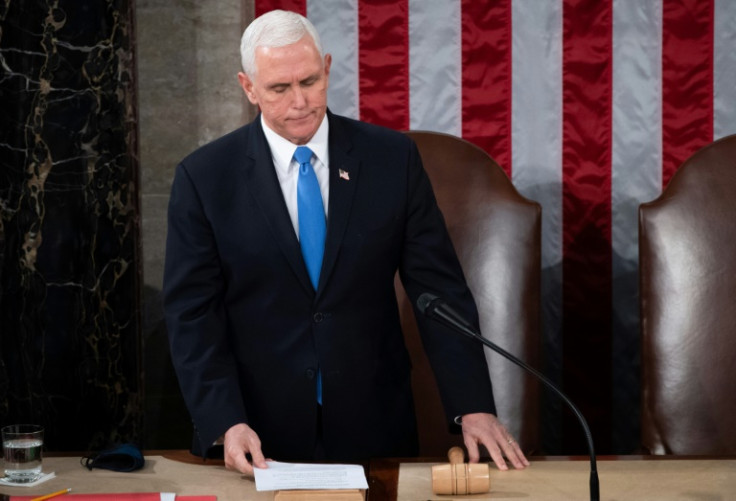AFP
Republican former vice president Mike Pence launched Monday his hotly-anticipated challenge to one-time boss Donald Trump for the party’s 2024 White House nomination, setting up the unusual scenario of two running mates becoming rivals.
Pence, a 63-year-old evangelical Christian, filed his nomination papers with the Federal Election Commission ahead of an official declaration to be made by video Wednesday in the early voting state of Iowa — joining an already crowded primary field.
He spent his 2017-21 tenure as vice president honing his reputation as a loyal deputy who brought the religious right into the tent and who was willing to defend the president against any accusation.
But he became a pariah in Trumpworld after rejecting the Republican leader’s demands that he overturn the 2020 election in his role as president of the Senate.
Berated constantly by Trump after Joe Biden’s victory — and even heckled at a conservative conference with chants of “traitor!” — Pence continued to praise the tycoon in public.
That eventually changed as Trump’s torrent of false claims of election fraud led to a mob chanting for Pence to be hanged at the US Capitol.
Since the riot, Pence has called out Trump for endangering his family and has emphasized his differences with the former president on issues ranging from the handling of Russian leader Vladimir Putin to abortion rights.
Pence has spent much of the last two years touring early-nominating states such as Iowa, South Carolina and New Hampshire to reinforce his political vision as a “Christian, conservative, Republican — in that order.”
His entry doesn’t much change the dynamics of the race, which is divided into three lanes — runaway leader Donald Trump, Trump’s closest rival Ron DeSantis, and everyone else.
Pence is framing himself as a traditional Republican, concerned with fiscal responsibility and family values, who can deliver Trump’s policies on the economy, immigration and much else without the drama.
Marking a contrast with Trump, Pence hasn’t ruled out welfare cuts and has allied himself strongly with Ukraine. He is an abortion hardliner who has opposed same-sex marriage.
While his politics are popular within the party, critics question whether Pence has a constituency in a party that is more focused now on populism and cultural politics than traditional conservatism.
And voters sympathetic to his decision to stand up for the Constitution have other candidate choices, such as the proselytizing Christian Tim Scott who do not bring with them the baggage of the Trump years.
“We all give (Pence) credit for certifying the election,” Republican strategist Sarah Longwell told Politico.
“But he also stood next to Donald Trump and normalized and validated him for four years while Trump ran roughshod over the presidency.”
Florida Governor DeSantis has consistently been polling almost 20 points above Pence and is hoping to outflank Trump from the right.
But DeSantis’s poor showing in head-to-head polls has opened the floodgates, with Chris Christie due to announce on Tuesday, joining former governors Nikki Haley and Asa Hutchinson in the race.
Like Haley and DeSantis, Pence has appeared determined to avoid conflict with Trump in hopes of wooing his former supporters should the cascade of criminal investigations targeting the former president take him out of the race.
The lower-ranked candidates have also pointed out that there is a long way to go in the race.
At the equivalent point in the 2016 primary — the first two weeks of June 2015 — Trump featured in five polls that put his support at between one and four percent.
Whether Pence can distance himself from Trump while peeling off the ex-president’s loyal base remains to be seen.
“The Trumpists are angry with him. The Never Trumpists are mad at him for his being part of the administration and support of an impeached, convicted insurrection promoter,” Republican strategist Chip Felkel told Vox.
“It’s a hard path.”

AFP






